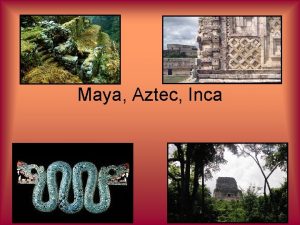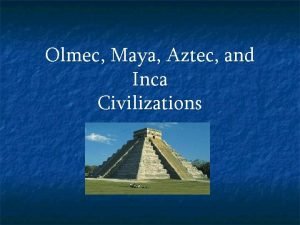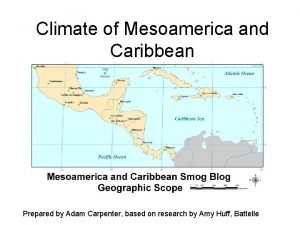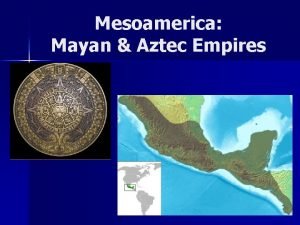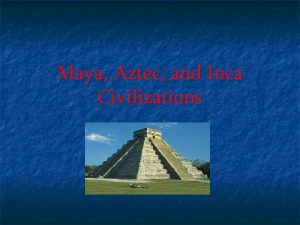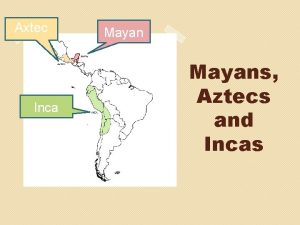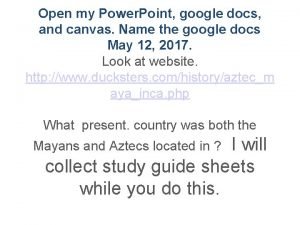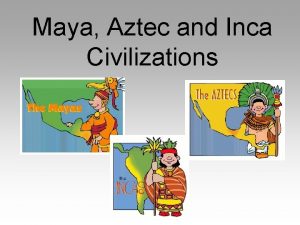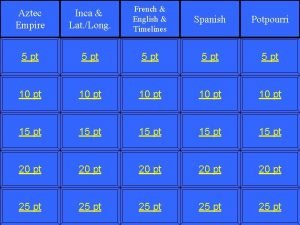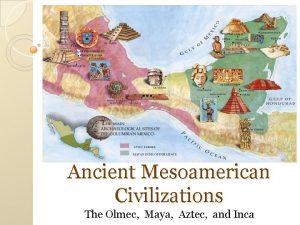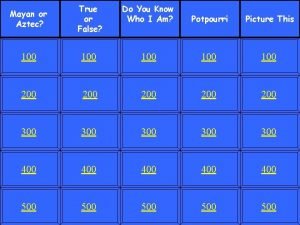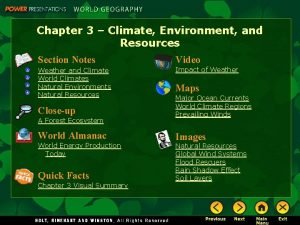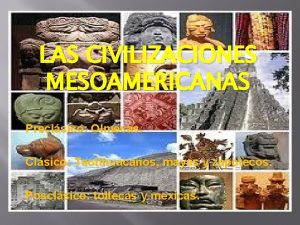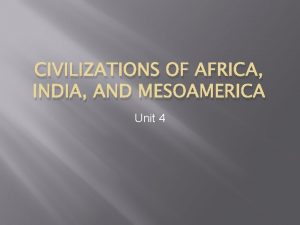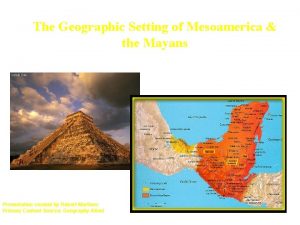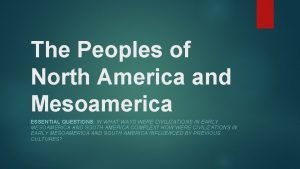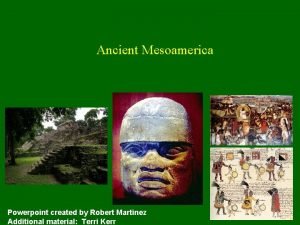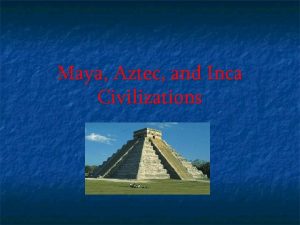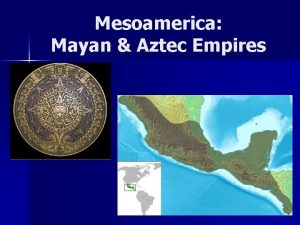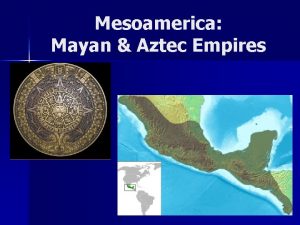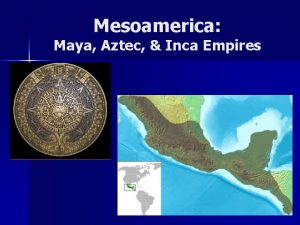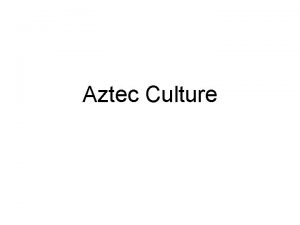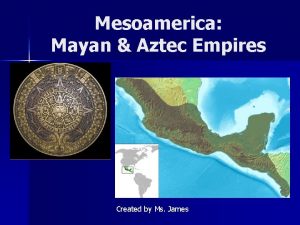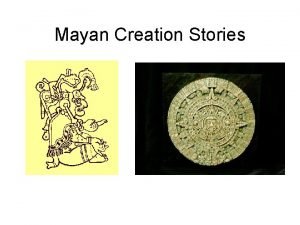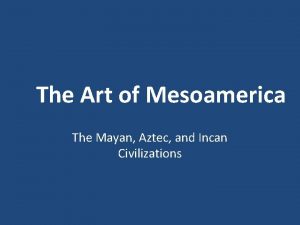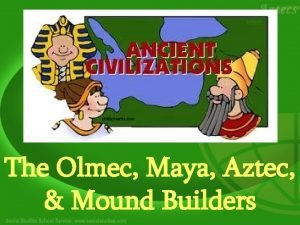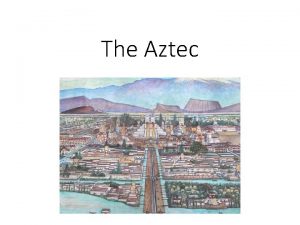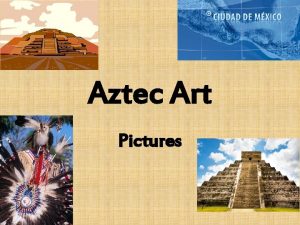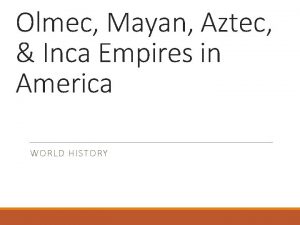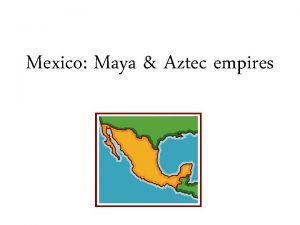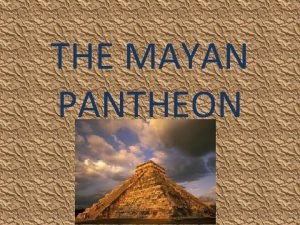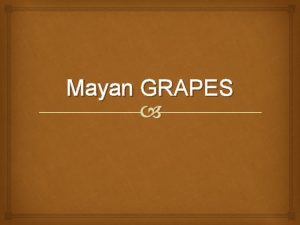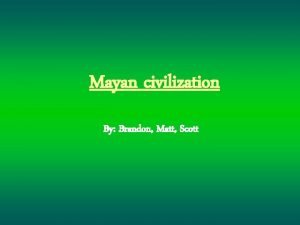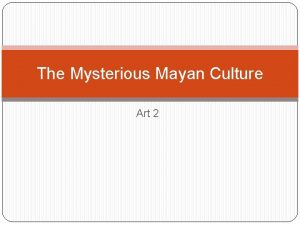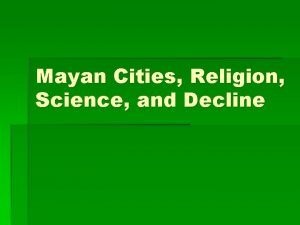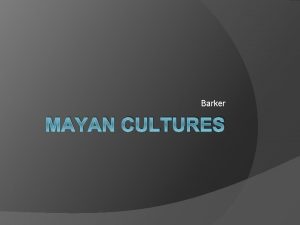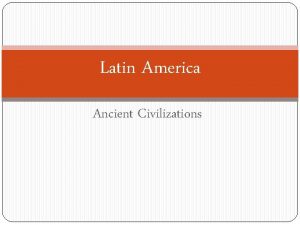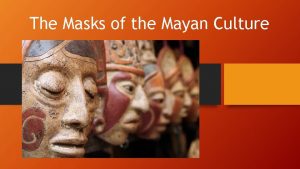Mesoamerica Mayan Aztec Empires Climate of Mesoamerica Warm

























- Slides: 25

Mesoamerica: Mayan & Aztec Empires

Climate of Mesoamerica Warm Temperatures n Plentiful Rainfall n Rich volcanic soils n – Good for growing crops like maize, beans, and squash.

Early Mesoamerican Civilizations n Olmec – (1200 BC to 300 AD) n Zapotec – (1500 BC to 750 AD) n Toltec – (900 to 1200 AD)

The Mayan Civilization n Developed around 1000 BC – At its height, Maya civilization consisted of some 10 million people spread among 40 cities.

Supporting Large Cities n Trade and agriculture helped support larger populations, and early Maya villages grew into cities.

Mayan Farming Practices n Slash and Burn Agriculture- a method of farming involves burning the vegetation to clear land for planting.

Mayan Cities & Government n Classic Age – (250 to 900 AD) n Mayans built: – Stone pyramids – Temples – Palaces n Who did they build them for? – Local Rulers (Kings) – Gods

Mayan Society & Religion n Society – Kings ruled with absolute power n It was believed they communicated with the gods. – Priests & Warriors n Upper Class – Merchants & Skilled Craftsmen n Middle Class – Farmers & Slaves n Lower Class n Religious Ceremonies – Offering of blood to the gods. (Blood Letting) – Ball Game n Only allowed to use your elbows, knees, and hips to get a rubber ball through a hoop. – Losing team sacrificed. – Human Sacrifice

Religion: Major Gods n Hunahpu – maize god. – Father of the hero twins – Most important deity for the Maya – He brought about the creation for the present world age. n Chac – god of rain, thunder, and lightning. – Both adored and feared by the Maya – He was portrayed as both a benefactor and a violent warrior.

Religion: Major Gods cont. n Gukumatz – Feathered snake god – Taught the Maya the arts of civilization, including codes of law, agriculture, fishing, and medicine. n Ixchel – Earth and Moon Goddess – Goddess of creativity, weavers and childbirth, goddess of medicine and reason, and a bringer of the storms.

Mayan Achievements n Architecture – Buildings – Canals Astronomy n Math n – Used Zero (0) Writing n Calendar System n

Mayan Calendar n The Maya had two calendars: – 365 day farming calendar – 260 day religious calendar n It was more accurate that the European calendar.

Decline of Mayan Civilization n Factors to decline: – Environmental Damage n Overuse of resources – Drought n Not able to feed everyone – Warfare Increased n Competition over lands – Abuse of Power by Kings

End Mayans

The Aztecs n Located in modern day Mexico, and Tenochtitlan was the capital city and is located in what is now present day Mexico City.

Rise of the Aztec Empire n According to legend, the war god told one of the tribes’ leaders that they should look for a place where they saw an eagle perched on a cactus eating a snake. It was there that they should settle and build a new capital. – They built Tenochtitlan after the prediction came true, and it was on a swampy island in Lake Texcoco.

Rise of the Aztec Empire Cont… n Population consisted of farmers & warriors. – Allied with Texcoco and Tlacopan. n After the alliance was formed the empire gained control over many region. – Ruled 400 – 500 other city-states. – 5 Million people under Aztec rule.

Aztec Empire n Conquered people paid tribute. – Tribute was a type of tax. n The Aztec Empire gained wealth: – Trade – Tribute

Tenochtitlan n Size n – Five square miles n n Approximately 3200 acres Population – 200, 000 Architecture – – – Walled City Pyramid Temples Palaces Ball court “Floating Gardens” n Chinampas – Canals – Markets

Aztec Society n Social Classes King Priests & Warriors Though people were born into a certain class it was possible to move up the ranks within a life time. Also apart of the middle class • Merchants and Artisans Farmers Slaves & Prisoners of War

Aztec Religion n Main deity in the Aztec religion was Huitzilopochtli and was known as both the sun god and war god. – Human sacrifice was practiced heavily in the Aztec religion. n Believed that these sacrifices gave power to the gods which in turn would insure the survival of the Aztec civilization.

Religion n War captives were used in the sacrifices – In times of peace the Aztec would have to resort to ritualistic warfar. n In the year 1487 the Aztecs reported killing 84, 400 war prisoners in four days at the great pyramid of Tenochitlan. – After a town was conquered the inhabitants where no longer eligible of sacrifice and became Aztec citizens.

Aztec Art n The Aztecs also made other religious and non-religious artifacts such as jade masks. – These artifacts were sold in markets by visiting merchants.

Aztec Achievements n Written Record – Glyphs- symbols that represented both objects and sounds. n Kept n track of tax record and business details. Astronomy – Calendar like the Mayans, but they also tracked the movements of some planets.

THAT’S ALL FOLKS!
 Mayan territory map
Mayan territory map Land empires
Land empires Aztec inca and maya map
Aztec inca and maya map Climate of mesoamerica
Climate of mesoamerica Mesoamerican aztec climate
Mesoamerican aztec climate What happened to the aztecs
What happened to the aztecs Mayan vs aztec vs inca
Mayan vs aztec vs inca Aztec and mayan map
Aztec and mayan map Mayans aztecs incas timeline
Mayans aztecs incas timeline Aztec mayan inca timeline
Aztec mayan inca timeline Mayan territory
Mayan territory Mesoamerican civilizations timeline
Mesoamerican civilizations timeline Am i aztec or mayan
Am i aztec or mayan Aztec and mayan similarities
Aztec and mayan similarities Climate change 2014 mitigation of climate change
Climate change 2014 mitigation of climate change Climate environment and resources
Climate environment and resources Greenhouse effect essay
Greenhouse effect essay Paises que componen mesoamerica
Paises que componen mesoamerica Periodo clásico los teotihuacanos mayas y zapotecos
Periodo clásico los teotihuacanos mayas y zapotecos Quipus
Quipus Mesoamerica inca
Mesoamerica inca Lesson quiz 14-1 pre-columbian america
Lesson quiz 14-1 pre-columbian america Geography of mesoamerica
Geography of mesoamerica The peoples of north america and mesoamerica
The peoples of north america and mesoamerica Mesoamerica powerpoint
Mesoamerica powerpoint Mesoamerica inca
Mesoamerica inca
